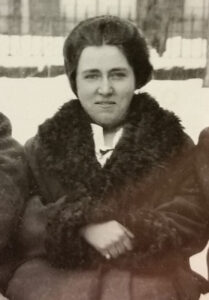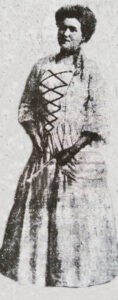The information below has been compiled from a variety of sources. If the reader has access to information that can be documented and that will correct or add to this woman’s biographical information, please contact the Nevada Women’s History Project.

At A Glance:
Born: March 13, 1890 in Virginia City, Nevada
Died: March 31, 1972 in Carthage, Missouri
Married: Richard Stoddard, Jack Clark
Primary City and County of Residence of Work: Reno, Washoe County, Nevada and Carthage, Missouri
Major Fields of Work: Legislator
Other Role Identities: Businesswoman, community activist
Biography:
Nevada legislator championed state Registered Nurse program
It is often said that history is made by someone at the right place at the right time, and this is certainly true of Marguerite Gosse; the right woman in the right place at the right time to make history in the nursing field in Nevada. After numerous tries in previous legislative sessions, in the 1923 Legislature she ushered through a statute that would enable a Nevada woman to become a “Registered Nurse” and earn the coveted RN licensing designation, rather than to leave the state to obtain the training.
Marguerite’s parents, Josephine Mudd Gosse and Harry Gosse, were Nevada Gold Rush pioneers. Marguerite, born in 1890, and her younger brother, Robert, started life in a small house next to their paternal grandparents’ hotel/boarding house located on a steep hill called the “Divide,” between the mining towns of Virginia City and Gold Hill.
In February 1896, Harry Gosse moved his family to Reno. He took ownership, with his attorney sister-in-law, Anna Mudd Warren, of the Riverside Hotel, formerly the historic Lake House, built by Reno founder Myron Lake.
An only daughter, Marguerite had an idyllic childhood. The family’s apartments were in the hotel, and her father extravagantly built her a miniature playhouse equipped with electric lighting and hotel linen and china. She became an expert horsewoman and her horse was stabled across the street. The Riverside was one of the most popular hotels on the West Coast, and Marguerite met many famous individuals who either stayed or took up rooms there.
Marguerite was immersed in Reno social life from an early age, and her independence and leadership skills were already forming. She attended Reno schools and graduated from the first Reno High School that was located near Saint Mary’s Hospital. Newspaper accounts show her to be one of the most popular young ladies of her senior class.

Instead of choosing to marry upon graduation in 1907, she attended the private Westlake School for Girls in Los Angeles, California. Upon returning, she enrolled at the University of Nevada, but after a semester, she quit to help her ill father with the hotel. She never lost her love and affiliation with the university, however, and years later she became the house mother, for a short time, for the Tri Delta Sorority.
Marguerite traveled extensively, sailing up and down the Pacific coast, even going north as far as Alaska. She was aboard the first boat that landed at the port in Hilo, Hawaii, that used a gang plank instead of leaving the ship via rowboat, and while in Hawaii, she rode horseback and hunted wild boar.
Tragedy struck when her brother, Harry, contracted meningitis on a troop transport to Hawaii in 1917. His death devastated the family, and Marguerite’s life took on a more serious tone.
At the age of 28, she joined the Red Cross during a period of national turmoil of World War I and the Spanish Flu pandemic. She became head of the Red Cross Reno Motor Corps, as well as working at the canteen, meeting soldiers as they passed on troop trains through Reno. She transported and arranged rides for Red Cross nurses and personnel in the pandemic. It was at this time that Marguerite learned Nevada was the only state in the union without nurses in the Red Cross service because of a lack of training and testing in Nevada.
All the Mudd-Gosse women were staunch suffragists, and Marguerite occasionally attended the legislature in 1919 with her aunt, Anna Mudd Warren, but she had little interest in any type of political career. Her interests lay more with service clubs, such as Business and Professional Women’s Club, Twentieth Century Club, Red Cross, and Y.W.C.A. She held leadership positions in all.
Marguerite had worked for a time in Los Angeles and become interested in a new organization called the Young Women’s Christian Association. In 1920 she accepted the position of Industrial secretary for the Y.W.C.A. in Sacramento, Calif., where she supervised social activities of 5,000 girls working in industries, including those working in canneries. In her position she supervised recreational activities and offered “wholesome and interesting” recreation for girls. Marguerite also helped to found a Y.W.C.A. Chapter in Reno in 1920.
In May of 1922, her father’s beloved Riverside Hotel burned to the ground. Marguerite stated, “It was after the Hotel burned and I was foot loose, that I began my political career of one session in the Assembly.” Friends had been urging her to run on the Republican ticket as a counterweight for another woman on the Democrat ticket. To her surprise, she won the election in November of 1922, and although she began with no legislative agenda, her tenure proved momentous for nursing in Nevada.
After her election, various groups lobbied her to reintroduce a legislative bill enabling Registered Nurse training to be sponsored and funded by the state. Nevada’s nursing cadre consisted mostly of practical nurses. These were mainly women with little formal training but with basic nursing skills, who worked as midwives or nurses for local doctors. Practical nurses were of importance to rural doctors, where medical help was scarce, at best. These doctors were afraid that highly trained registered nurses, commonplace in every other state of the nation, would negatively affect the number of practical nurses in rural communities because, in addition to demanding higher pay for their skill sets, few R.N.s would choose to live in rural areas. Nevada physician opposition had led to the failure of Nevada Registered Nurse program legislation for three previous legislative sessions.
Marguerite introduced the Nurse Practice Act in the Assembly in 1923. After passing in the Assembly, a hard-fought battle in the Senate was waged, with all of Assemblywoman Marguerite’s many interpersonal skills utilized in helping senators see the value of a nurse exam and licensure program. The measure passed. Governor Emmet Boyle signed the legislation into law in March 1923. The bill provided funding and creation of a state commission to plan curriculum and a standardized competency test that would enable applicants to be certified as Registered Nurses.
After her Assembly session closed in 1923, Marguerite’s life continued on a less frenetic plane. Shortly thereafter, she married widower, District Judge and former State Attorney General Richard C. Stoddard, a family friend, and whose deceased wife Marguerite had been close to. Marriage later in life gave her an instant family, as Richard also had a 10-year-old son. Although she ran for another term in 1924, she lost the primary election.
She had experienced a career, became a wife and mother, and now participated in the organizations she chose, in ways that women historically promoted social progress. But that life was shattered only 23 months later with the death of her husband.
At loose ends after Richard died, Marguerite worked in her sister’s button shop, raised her stepson, Richard Jr., became a sorority house mother for a short time, and continued her club work. Marguerite married a local entrepreneur, Jack S. Clark, in 1929.
The couple lived an uneventful life in Reno until 1946 when Jack purchased some land near his family home in Carthage, Missouri. They opened a trailer park called the “Reno House Trailer Park.” Marguerite’s major accomplishment slipped into obscurity outside of the nursing profession. Although she received national attention at the time of the Nursing Bill’s passage in 1923, when she died in Carthage March 31, 1972, there was little or no mention in either Nevada or Missouri newspapers of her death.
The Mudd-Gosse women may have contributed to the status of women in Nevada more than any other Nevada family unit. Marguerite’s mother, Josephine, and grandmother, Minnie Mudd, were early club members whose accomplishments produced the first public kindergarten in Nevada and culminated with 1914 Nevada women’s suffrage. Her aunt, Anna Mudd Warren, became the fourth woman attorney admitted to the Nevada State Bar Association in 1899, and the first woman U.S. Commissioner for Nevada in 1913. Her Aunt Lizzie Mudd became the first woman bank officer in Nevada, paving the way for women to be accepted in mainly male-dominated managerial positions. One family could not ask for a better legacy.
Researched and written by Patti Bernard
Sources of Information
“A biography of Marguerite H. Gosse who introduced the bill into the legislature that became the first Nevada state Nurse Practice Act, of 1923.” Puddington, Grace. August 19, 1960. University Special Collections –MARS 83-27 to 83-31, University of Nevada, Reno, Nevada.
“Appeal for Nurses’ Bill Made by Mrs. Donnelley.” Reno Evening Gazette (Reno, Nevada), p. 6:6. Sec. Letters to the Editor.
Assumes Secretary’s Duties-Miss Gosse Will Supervise Social Activities of 5000.” Reno Evening Gazette (Reno, Nevada), March 15, 1920, p. 5:2.
“Clothing Drive Starts Monday.” Reno Evening Gazette (Reno, Nevada) March 18, 1919, p. 6:3.
“Extensive Survey to Be Made of Reno.” Reno Evening Gazette (Reno, Nevada), January 20, 1920. p. 14:3.
“Four Women Successful and Will Have Voice in Next Legislature of Nevada.” Reno Evening Gazette (Reno, Nevada), November 10, 1922, p. 1:7.
“House Flooded with New Bills.” Reno Evening Gazette (Reno, Nevada), March 3, 1923, p. 2:1.
“Legislature’s Work Yesterday.” Reno Evening Gazette (Reno, Nevada), Feb. 17, 1923, p. 2:3.
“Linen Show Drive Collect for Red Cross-Call Marguerite Gosse.” Reno Evening Gazette (Reno, Nevada), Dec. 3, 1918, p. 3:2.
“Miss Gosse has Hornet’s Nest.” Reno Evening Gazette (Reno, Nevada), February 24, 1923, p. 6:3.
“Miss Marguerite H. Gosse.” Reno Evening Gazette (Reno, Nevada, August 22, 1923, p. 4:3. Sec: Society.
Republicans Lead in Elections for State Legislature.” Nevada State Journal (Reno, Nevada), Nov. 11, 1922, p. 8:2.
“Nurses Bill is Given Approval.” Nevada State Journal (Reno, Nevada), Feb. 22, 1923, p. 2:1.
“Nurses’ Bill Finally Wins.” Reno Evening Gazette (Reno, Nevada), March 15, 1923, p. 2:6.
“Miss Marguerite Gosse who has been visiting with her aunt, Mrs. Anna Warren at the Legislature.” Nevada State Journal (Reno, Nevada), March 8, 1919, p. 5:5. Sec: Society.
“Society.” Reno Evening Gazette, September 5, 1908, p. 6:3.
“Will Attend Girls’ School in Los Angeles.” Reno Evening Gazette (Reno, Nevada), Aug. 24, 1907, p. 3:2. Sec: Society.“Women’s Home Magazine – Mrs. Marguerite H. Gosse.” Sandusky Star Journal (Sandusky, Ohio), Sept. 22, 1923, p. 5:1.
